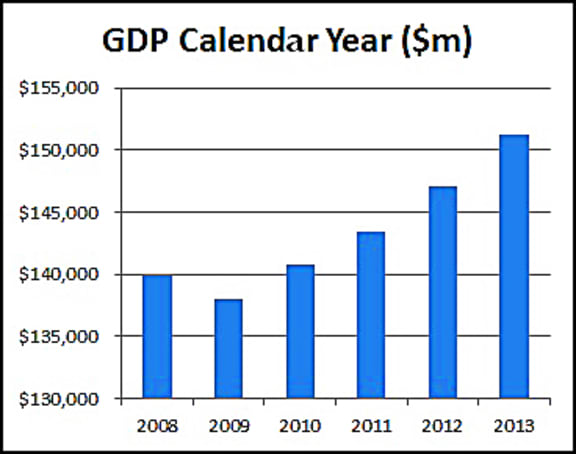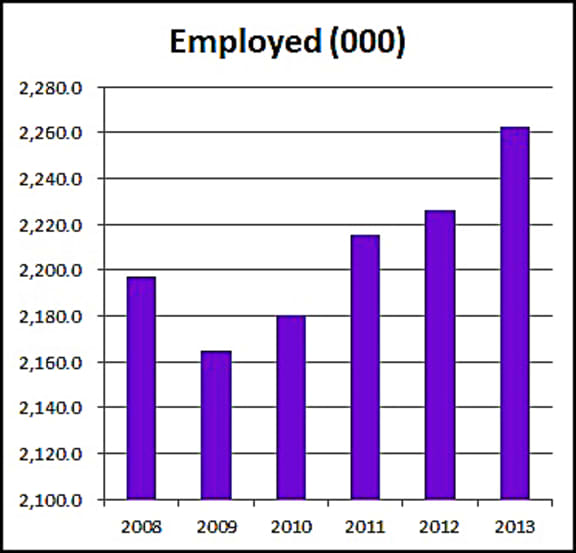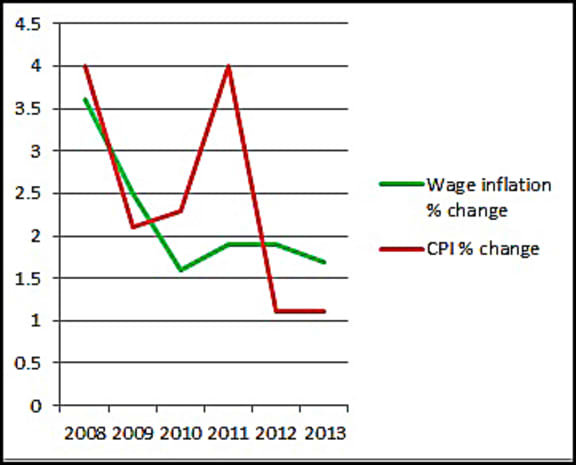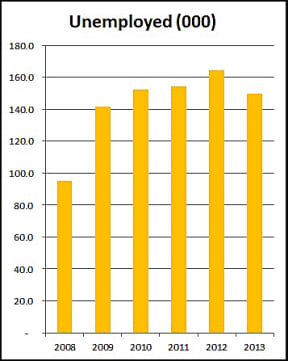A fast-growing economy usually favours the incumbent in an election year.
While the pace of activity now appears to be easing, the economy is growing about 3.5 percent a year, creating jobs and helping the Government in its aim to return to budget surplus next year.

Graphic: RNZ / Patrick O'Meara
That's a solid platform for National leading into the 20 September general election, allowing it to position itself as the party people can trust to manage the economy effectively.
But Opposition parties are having none of it.
The Labour Party counters that unemployment is higher than in 2008 when National took power, exports have fallen as a percentage of national output, wages have stagnated and inequality has worsened.
And the Greens say that, unless the environment is taken into greater consideration, the economy will flounder.

Jobs, wages and other economic issues are important to New Zealand households, a survey shows. Photo: 123RF
What do voters think?
The economy remains vitally important to households.
When asked about the most important problem facing the country, a Roy Morgan poll in May found economic issues dominated, with 44 percent of New Zealanders mentioning it.

Graphic: RNZ / Patrick O'Meara
Within that category, nearly one in five cited poverty and the gap between rich and poor as the most important economic issue.
New Zealand wasn't as badly affected by the global financial crisis as some developed countries.
But NZIER principal economist Shamubeel Eaqub has pointed out this boom has not equally benefited all communities, and poverty should not be ignored.
For many people the real question may be whether they feel better off.
Consumer confidence surveys indicate people are cautiously optimistic that the stronger economy will translate into more disposable income in their pocket.
Job growth has expanded at its fastest pace in a decade. Most regions are experiencing lower unemployment. But for some, like Northland, unemployment remains stubbornly high. And for Maori and Pacific people, joblessness is double the national rate.
Wage growth mixed

For over three years between 2008 and 2013 wage increases fell behind price rises. Graphic: RNZ / Patrick O'Meara
New Zealanders' weekly earnings went up on average from just over $750 a week in 2008 to nearly $900 a week in 2013.
However real wages, after inflation, are hardly growing - although demand for some, like those in IT, finance and some trades - is translating into better pay. And, as BusinessNZ chief executive Phil O'Reilly has pointed out, the unskilled will find it harder to secure substantial pay rises.
In addition, debt - mainly in housing - continues to weigh heavily on New Zealanders. Rising mortgage costs and slowing house price growth may have households wondering whether they're getting ahead.
And economists point out that pay rises tend to lag a pick up in the economy, because firms want to be sure any increase is sustainable.

There's broad agreement lifting skills and producing more high tech graduates will help achieve a high wage economy. Photo: 123RF
The economic debate
The political parties are vying to convince voters of the merits of their approach to managing the economy.
Labour argues workers are not getting a fair slice of the economic pie. It has proposed lifting the minimum wage by a couple of dollars, strengthening workers rights, while, on the tax side, increasing tax rates for high earners to 36 cents in the dollar.
Concern about the gap between rich and poor has also prompted them to propose a capital gains tax, and ensure all streams of wealth are taxed, not just income.
For the Greens, child poverty is priority, and they're proposing raising the top tax rate to 40 cents in the dollar to raise money to tackle it.
National says Labour's approach will cost jobs and hobble growth. Instead, it is backing current policies of restraints on government spending to take pressure off interest rates, and a further loosening of employment laws. It is also signalling modest income tax cuts to spur growth once the budget is back in surplus.
But an important question for all parties is how they plan to achieve a high growth, high wage economy - not an an idle question given the ever- rising cost of an ageing population.
Achieving such an economy has proved elusive, with New Zealand's growth tending to come in fits and starts.
Politicians, business and unions all agree lifting skills and training, producing more high tech, science and engineering graduates, strong infrastructure and internet links, and boosting research and development will help. The argument, however, is in the detail.

Graphic: RNZ / Patrick O'Meara
The country's main business lobby group, BusinessNZ, is broadly happy with the path taken by the National-led government including targeted support for exporters and a focus on science and engineering graduates, though they want a lower corporate tax rate as well.
Unions and business groups like the Manufacturers and Exporters Association say it has failed to build a diverse and resilient economy.
They single out its hands-off approach to the persistently high dollar, which they argue hurts exporters, and has already cost the country many high-wage manufacturing jobs.
The National-led government bats off such criticism, pointing to a rise in annual exports of 12 percent to more than $51 billion in the year to June, despite the high dollar.
And it's not just dairy, logs and meat. Economic Development Minister Steven Joyce, says ICT, high-tech and medium high-tech manufacturing has grown to nearly 8 percent of total exports due to the Government's policies.
Mr Joyce says the high dollar also has its uses, making it cheaper for firms to buy the plant and machinery that they need to become more productive.
For its part, the Labour Party is proposing to make KiwiSaver compulsory and consider increasing contribution levels to help the Reserve Bank keep price rises under control.
Finance spokesperson David Parker says that would take pressure off interest rates and the dollar. And the party's proposed capital gains tax would reduce the tax advantages enjoyed by property investors and help boost productive investment, he says.
The Green Party would go even further, introducing a carbon emissions tax to help ensure a sustainable economic future, an idea move business and National dismiss as economic suicide.
So, the economy remains a vital contest of ideas for political parties and which way voters will be swayed, if at all, remains to be seen.

